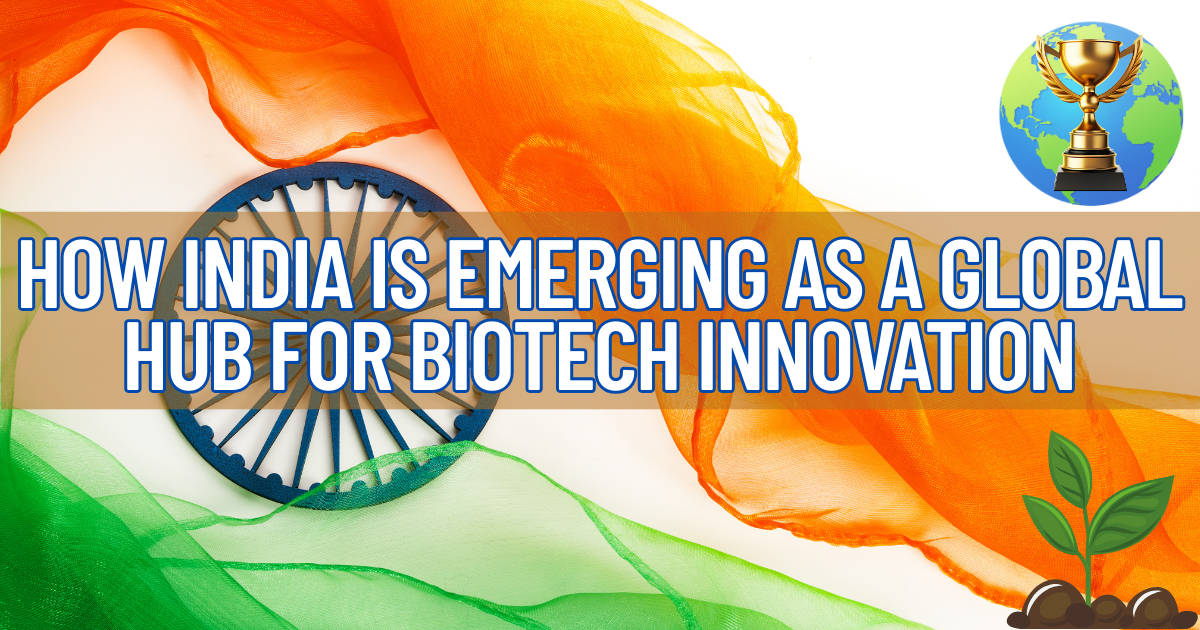How India Is Emerging as a Global Hub for Biotech Innovation. In the past decade, India has achieved many innovations, vaccines, and other things in the field of biotech innovation. India has emerged as a global biotech innovation hub with 9,000 biotech startups. India has shown the world its remarkable transformation. To know more about the topic “How India Is Emerging as a Global Hub for Biotech Innovation,” read the complete article.
How India Is Emerging as a Global Hub for Biotech Innovation
India ranks among the top 12 global biotech destinations and is the third largest in the Asia Pacific, holding around 3% of the global biotechnology market share. With the nation positioned as a leader in bio-innovation and biomanufacturing, biotechnology is now a key sector in India’s goal to achieve a USD 5 trillion economy by 2025. With 9,000 biotech startups, India has emerged as a global biotech innovation hub, said Dr. Jitendra Singh, Union Minister of State (Independent Charge) for Science and Technology, on Wednesday.

“The number of biotech startups in India has grown exponentially from just 50 in 2014 to nearly 9,000 today, solidifying India’s position as a global hub for biotech innovation,” Singh said. He informed us that India now ranks third in the Asia-Pacific region and 12th globally in bio-manufacturing, underscoring the increasing importance of research in microbial genetics, infectious disease, fermentation technology, environmental microbiology, and bioinformatics.
Bioeconomy of India
The bioeconomy is the use of renewable biological resources to produce food, energy, and industrial goods, which supports sustainability and economic growth. Innovations like gene editing and bioprinting are driving progress, while integration across sectors strengthens long-term impact. By aligning biotechnology with digital tools and circular economy principles, the bioeconomy offers sustainable solutions to environmental challenges and promotes overall societal well-being.
Bioresources like plants or microorganisms are renewable, relatively cheap, and locally available, while natural processes are more sustainable and eco-friendly.
Key Factors Contributing to India’s Biotech Growth
Government Support and Policies
India’s biotech industry has received unprecedented backing from the government, paving the way for accelerated growth.
Department of Biotechnology (DBT): Established in 1986, DBT plays a crucial role in policy-making, funding, and innovation.
National Biotechnology Development Strategy: Focuses on R&D, bio-clusters, and skill development to strengthen India’s biotech ecosystem.
Production Linked Incentive (PLI) Scheme: Provides financial support to biotech manufacturers, reducing import dependence.
Demographics
India’s 1.4 billion+ population is not just a massive consumer base but also a critical enabler for life sciences research. The country’s diverse genetic makeup provides pharmaceutical companies with the ability to test drugs across multiple demographic groups, making India a preferred destination for clinical trials.
The aging population (67% aged 15-64) and rising life expectancy create increasing demand for healthcare solutions and targeted therapies. India’s demographic advantage accelerates late-stage drug testing, particularly for global pharmaceutical companies seeking robust, real-world data.
Talent Pool: Skilled workforce with Global Expertise
India produces the 2nd highest number of STEM graduates globally, second only to China. This strong talent base, combined with an English-speaking workforce, makes India a powerhouse for life sciences innovation and related industries.
India has become a favorite destination for multinational companies to establish Global Capability Centers (GCCs), focusing on product innovation, Big Data analytics, and digital transformation. As of 2023, there were nearly 1,600 GCCs in India, and this number is expected to grow to 1,900 by 2025.
Over 40 GCCs in the life sciences sector are managed by companies like AstraZeneca, GSk, Eli Lilly, and Bayer. Beyond core R&D, India’s talent pool also helps with back-office operations like finance, IT, and regulatory, guaranteeing effortless and smooth business continuity for global companies.
Established Pharmaceutical Ecosystem
India has a well-developed and mature pharmaceutical ecosystem, making it an integral part of the global life sciences value chain.
Generics and APIs: India is the second-largest generics manufacturer globally, meeting 20% of the global demand for generics.
Vaccine Manufacturing: India is the biggest vaccine manufacturer in the world, providing over 1/3rd of all vaccines worldwide. Genome Valley in Hyderabad houses significant vaccine producers like Bharat Biotech and Biological E.
Contract Development and Manufacturing Organizations (CDMOs) and Contract Research Organizations (CROs): These industries flourish in India and support outsourcing of drug development, testing, and production. The Indian CDMO market is expected to grow at a compound annual growth rate (CAGR) of 14.67% from 2024 to 2029, from its current size of USD $22.51 billion to USD $44.63 billion.
